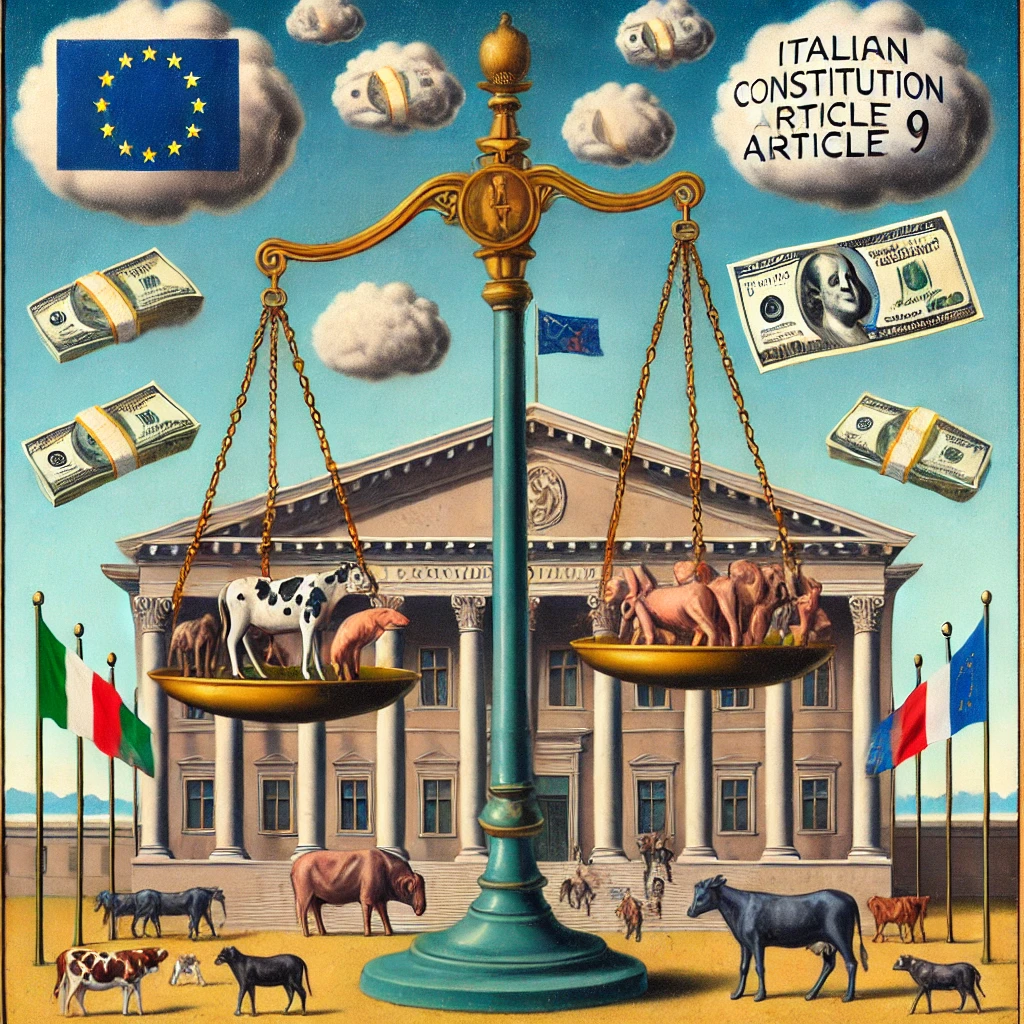
Italian administrative Courts, competition and services of general economic interest of local relevance: a general overview
Vera Parisio | 27 August 2024 | Not Yet in an issue
Il saggio si concentra sul ruolo chiave del giudice amministrativo, alla luce dell’art. 133 del Codice del Processo Amministrativo, d.lgs. n. 104 del 2010. Il giudice amministrativo agisce come garante delle regole di concorrenza nel settore dei servizi di interesse economico generale (SIEG) di rilevanza locale, insieme alle istituzioni europee, per la piena ed efficace attuazione del diritto europeo.
Read MoreConsiglio di Stato, Sez. VI, ord. 11 giugno 2024, n. 5235
Riccardo Di Stefano | 22 August 2024 | Not Yet in an issue
Con l’ordinanza segnalata, il Consiglio di Stato solleva due questioni pregiudiziali alla Corte di Giustizia relative all’ambito d’applicazione soggettivo e oggettivo del regime di responsabilità “agevolato” degli hosting provider ex art. 14 Direttiva c.d. E-Commerce (Direttiva 2000/31/CE), in rapporto ad una sanzione amministrativa comminata a Google per pubblicità di gioco d'azzardo su YouTube.
Read MoreLa Corte ha dichiarato costituzionalmente illegittimi gli art. 1, comma 2, lettera f) e 7, comma 2, lettera d), del d.lgs. n. 39/2013, nella parte in cui non consentono di conferire l’incarico di amministratore di ente di diritto privato – che si trovi sottoposto a controllo pubblico da parte di una provincia, di un comune con popolazione superiore a quindicimila abitanti o di una forma associativa tra comuni avente la medesima popolazione – in favore di coloro che, nell’anno precedente, abbiano ricoperto la carica di presidente o amministratore delegato di enti di diritto privato controllati da amministrazioni locali.
Read More
Il Dibattito pubblico nel nuovo codice degli appalti: tra democrazia partecipativa, tempo e risultati
Benedetto Marsili | 2 August 2024 | Not Yet in an issue
Il dibattito pubblico ha vissuto in Italia una storia complessa: dagli esperimenti compiuti in assenza di una disciplina normativa si è passati a una prima regolazione a livello regionale e poi al definitivo assesto nel codice dei contratti pubblici. Di conseguenza, la disciplina dell’istituto è stata oggetto di modifiche in virtù dell’entrata in vigore del nuovo codice degli appalti introdotto con il d.lgs. 36/2023. Il presente lavoro si occupa di analizzare l’evoluzione del dibattito pubblico. Dalle origini della partecipazione in materia ambientale nelle convenzioni internazionali, al modello francese che ha ispirato il nostro ordinamento, per arrivare alla disciplina attuale e ai suoi tanti aspetti problematici, con un’attenzione particolare al ruolo che in generale possono svolgere gli strumenti partecipativi nel settore delle opere pubbliche.
Read More
Template di nuova generazione per facilitare il passaggio dai documenti ai dati nel sistema giudiziario italiano
Amedeo Santosuosso, Stefano D'Ancona, Emanuela Furiosi | 29 July 2024 | Not Yet in an issue
Il sistema giudiziario italiano potrebbe essere in procinto di compiere una transizione storica: dalla mera digitalizzazione dei propri documenti a un’attività giudiziaria plasmata dalle possibilità che il digitale offre, compreso l’utilizzo di tecniche di intelligenza artificiale nello svolgimento della funzione giurisdizionale. Il presente contributo offre una sintesi della ricerca svolta dagli Autori, come componenti del gruppo di ricerca dello IUSS Pavia, nell’ambito del progetto NEXT GEN UPP, lanciato nel 2021 dal Ministero della Giustizia italiano con l’obiettivo di potenziare la digitalizzazione delle attività giudiziarie, migliorare i processi organizzativi e promuovere l’applicazione degli strumenti di Legal Analytics (LA) ai testi giuridici. L’attività descritta nel saggio riguarda la progettazione di “template di nuova generazione” funzionali alla redazione degli atti di giudici e di avvocati: modelli in grado di massimizzare l’efficienza dell’attività giudiziaria e di creare un ambiente informatico adatto all’utilizzo delle più avanzate tecnologie di intelligenza artificiale.
Read More
Tutela del benessere animale ed interessi economici tra diritto nazionale ed eurounitario
Micaela Lottini | 22 July 2024 | Not Yet in an issue
La III Sezione del Consiglio di Stato, in una ordinanza del luglio 2023, afferma che l’articolo 9 della Costituzione, come novellato, ha di fatto inserito la tutela degli animali tra i cosiddetti ‘principi supremi’; conseguentemente, la compromissione dell’interesse dell’animale (ed in particolare la perdita della vita) può avvenire solo a seguito di una rigorosa valutazione sulla necessità e proporzionalità della misura da adottarsi, questo in particolare quando l’interesse umano che rileva è un interesse meramente economico.
Read More
La doppia legittimità democratica dell’Alta Autorità e della Commissione europea
Jacques Ziller | 15 July 2024 | Not Yet in an issue
Fin dai primi anni della Comunità europea del carbone e dell’acciaio, il sistema di governo delle Comunità e poi dell’Unione europea è stato a un sistema parlamentare dualistico. La Commissione europea ha bisogno di un rapporto di fiducia sia con il Consiglio (e il Consiglio europeo) che con il Parlamento europeo. Il saggio sostiene che, di conseguenza, in questa prospettiva sia decisivo riconoscere il ruolo peculiare affidato al Consiglio europeo e al Parlamento europeo nei confronti delle altre istituzioni dell’Unione per il buon funzionamento delle principali istituzioni dell’Unione.
Read More
Dati personali e fini pubblici: dubbi di compatibilità europea del Codice Privacy
Gherardo Carullo | 8 July 2024 | Not Yet in an issue
L’articolo analizza le condizioni di liceità del trattamento di dati personali applicabili alle pubbliche amministrazioni nell’esercizio delle loro funzioni, alla luce della disciplina europea e di quella nazionale. Il contributo pone quindi in discussione la compatibilità della normativa italiana con quella sovranazionale in quanto il nostro legislatore ha autorizzato in via generale il trattamento di dati personali e lo scambio di tali dati tra autorità pubbliche ogniqualvolta questo sia necessario per il perseguimento di fini istituzionali, laddove invece il legislatore europeo richiede che la base giuridica nazionale si fondi su un criterio di proporzionalità tra trattamento dei dati e fini pubblici perseguiti.
Read MoreConsiglio di Stato, Sez. III, 27 maggio 2024, n. 4701
Corso Tozzi Martelli | 28 June 2024 | Issue 2/2024
La sentenza evidenzia come sia necessario declinare in maniera dettagliata e coerente i criteri ambientali minimi nella documentazione di gara, ritenendo essa insufficiente un mero rinvio ai decreti ministeriali. Questo approccio garantisce che le prestazioni contrattuali rispettino effettivamente le norme ambientali, promuovendo una maggiore sostenibilità negli appalti pubblici.
Read More
Intelligenza artificiale e contratti pubblici: problemi e prospettive
Giovanni Fabio Licata | 26 June 2024 | Issue 2/2024
Dopo avere operato una distinzione preliminare tra l’Intelligenza Artificiale come strumento per lo svolgimento di procedure di acquisto da parte della pubblica amministrazione, e l’Intelligenza Artificiale come oggetto di tali acquisti, il contributo si concentra sull’analisi del fondamento e dei limiti del contratto pubblico quale elemento di regolazione dell’Intelligenza Artificiale. Si ritiene, infatti, che stabilire un'interazione sistemica tra l'acquisto di AI da parte delle Pubbliche Amministrazioni e la regolamentazione dell'IA stessa sia cruciale. Ciò contribuirebbe a determinare i contenuti delle norme e la qualità dei risultati associati all'uso dei sistemi di IA in ambito pubblico.
Read More